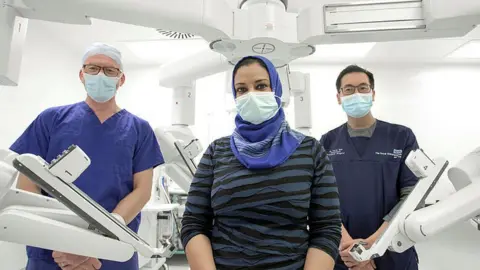New robot aiding surgery at Wolverhampton hospital
 The Royal Wolverhampton NHS Trust
The Royal Wolverhampton NHS TrustRobots are being used to help tackle surgery backlogs following the Covid-19 pandemic.
New Cross Hospital has two Da Vinci Xi robots working every week on cases in urology, colorectal, cardiothoracic and gynaecology surgery.
Royal Wolverhampton NHS Trust said while robotic operations could take longer, there were other benefits.
These include shorter hospital stays and quicker recovery times for patients.
The procedures can also often result in less bleeding, reduced infection risk, less post-operative pain and smaller scars, the hospital trust said.
The miniature instruments are introduced into the body through a small insertion and controlled by surgeons at all times to perform specific tasks.
Mr David Mak, consultant urological surgeon, said it meant operations could be performed "more accurately" due to the precision the robots offer.
The trust has secured one new robot to join another it has had on lease since September 2020, which performs surgery for prostate, bladder and kidney cancers; lung cancers, gynaecology cancers and the treatment of endometriosis.
They also perform colorectal resections, where a cancerous part of a colon is removed - the hospital is believed to be one of only 20 centres in the UK offering the procedure.
Mr Pete Cooke, consultant urological Surgeon, introduced the first programme of urological robotic surgery in the West Midlands to the trust in 2011.
Since then, more than 2,000 patients have benefitted.
"Over the last decade there have been a number of changes in robotic surgery, and the machines now offer advanced features with the ability to do ever more complex operations," he said.
"I'm very proud to have led this within the organisation and our results are there to see."
Training is now planned for the head and neck team so it can start undertaking some of its procedures robotically.

Follow BBC West Midlands on Facebook, Twitter and Instagram. Send your story ideas to: [email protected]
